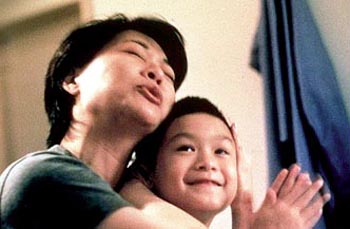![[Metroactive Movies]](/movies/gifs/movies468.gif)
[ Movies Index | Show Times | San Jose | Metroactive Central | Archives ]
 Save the Last Cadence for Me: Elaine Jin entertains Jonathan Chang in 'Yi Yi.' Taipei Personalities Edward Jang's family drama 'Yi Yi' is an instant classic IN LEE SERVER'S BOOK Asian Pop Cinema, 53-year-old film director Edward Jang is accused of a charge he's faced in his native Taiwan. Jang, a Western-educated filmmaker, supposedly goes against the grain of popular Asian entertainments, namely, the martial-arts films commemorated in Jang's fellow countryman Ang Lee's brilliant Crouching Tiger, Hidden Dragon. Because Jang's work isn't a thrill ride, it's called self-indulgent, elitist. Here is the crass viewpoint that's ruined so many Hollywood films and killed so many unseen classics. Fortunately, Jang's new film, Yi Yi, won the best director prize at Cannes, in addition to being the surprising pick for best film of 2000 by the National Society of Film Critics. Yi Yi is getting a chance, and if ever a film deserved a chance, this is it. The title is translated as "A One and a Two"--a musician setting the cadence for a song. So much of what we hear in Yi Yi is the music in life that never begins--and always seems ready to start. Yang's film follows the unhappy Jing family, troubled with the crisis of their beloved grandmother in a coma. Unwilling to deal with her sorrow, the ailing woman's daughter, Min-Min (Elaine Jin), flees to a religious retreat, leaving her husband and children holding the bag. The clever but picked-on 8-year-old Yang-Yang (Jonathan Chang, a mesmerizing child actor) is the one who takes it all the most easily. He's distracted by a new discovery: he's coming to understand what photography is all about. Yang-Yang's older sister, Ting-Ting (Kelly Lee), a tender girl, is tried by first love and a new friendship; through no fault of her own, she fails at both. Lastly comes the father of the family, N.J. (Nien-Jen Wu). He's a middle-aged man whose dreams of studying music were overruled by the practical people around him. This picture of midlife crisis is heightened and sharpened by N.J.'s knowledge that he did this to himself. In the great Jean Renoir tradition, Yang sees no villains, only victims. As background to this rich film is the emotional atmosphere of the collapse of the Asian financial bubble, mirrored in the cynical wheeling and dealings of N.J.'s company, which is in the business of making crappy video games. Business forces N.J. into betraying the first man he could respect in a long time, Ota (Issey Ogata), the kind and philosophizing head of a Japanese graphics outfit. YANG HAS AN instant classic here, but Yi Yi is not an easy film. His technique is remote. Some of the most powerful scenes are directed 200 feet away from the actors. Yang wants to make sure you feel the glass and steel of Taipei, this cold, spotless new city that seems to have just arrived from the store with the plastic wrap still on it. The introduction of Western customs and big easy money has hit this island like a bomb. Suddenly, a face-conscious people has seen how the rest of the world lets all their emotions out and follows suit. Thus Yi Yi is a juicy film for its surface remoteness. Only N.J. is really repressed, while the people around him act out in fights, arguments and, in one case, murder. Yi Yi has a hundred different memorable moments: N.J. watching at a piano bar where a new friend is playing the poignant Japanese pop song known here as "Sukiyaki"; a dreamy, serenely tragic parting note to a dying woman--maybe the most wrenching deathbed scene I've ever watched, yet delicate and underplayed. And there's the following interchange between the bright kid and his brooding father: "Daddy," Yang Yang says. "I can't see what you see. And you can't see what I see. How can I know what you see?" The father replies, "Good question. That's why we need a camera." While portraying a family in stress, Yang makes a plea for movies that aren't escapist. In one scene in Yi Yi, a character gives his opinion that the movies have tripled the length of our lives. We can watch it and see other lives, and see what might have happened if we'd taken other courses, made other choices. Here, through the voice of a little boy, Yang has made it clear what the purpose of drama is, as opposed to satisfying but often empty action cinema.
Yi Yi (Unrated; 173 min.), directed and written by Edward Yang, photographed by Wei-han Yang and starring Nien-Jen Wu, Jonathan Chang and Kelly Lee. Opens Friday at the Towne Theatre in San Jose. [ San Jose | Metroactive Central | Archives ]
|
From the January 18-24, 2001 issue of Metro, Silicon Valley's Weekly Newspaper.
Copyright © 2001 Metro Publishing Inc. Metroactive is affiliated with the Boulevards Network.
For more information about the San Jose/Silicon Valley area, visit sanjose.com.